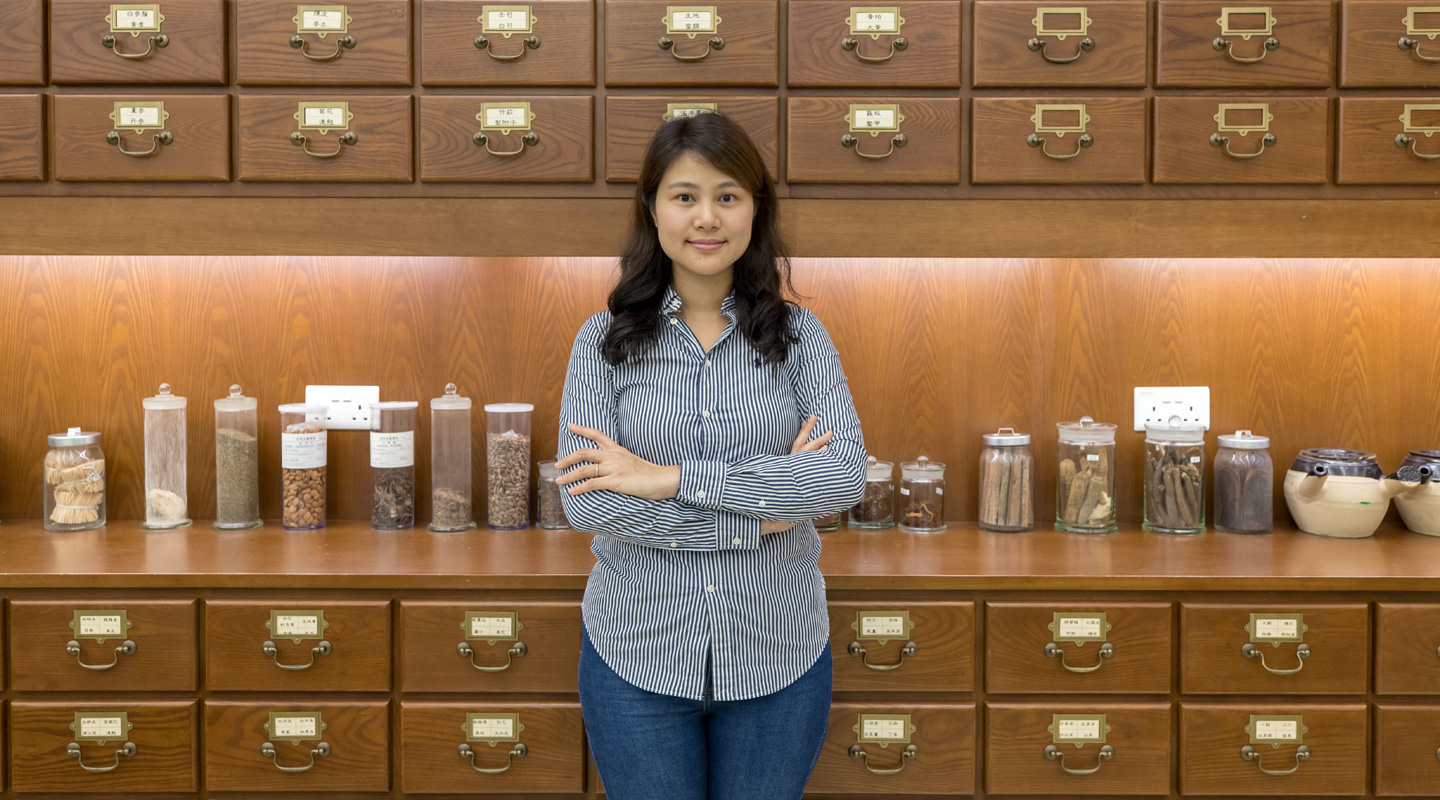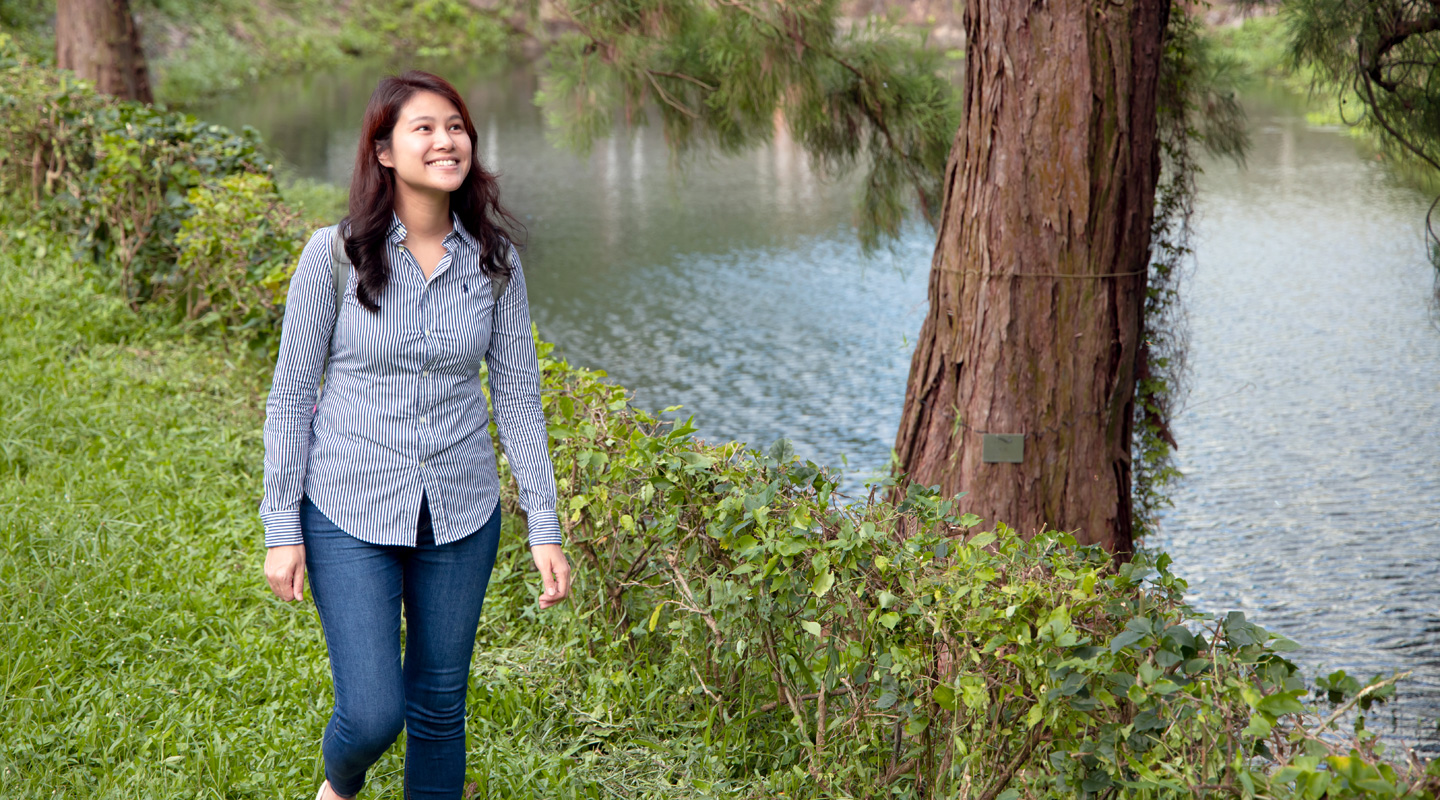Dear readers, With the launch of e-newsletter CUHK in Focus, CUHKUPDates has retired and this site will no longer be updated. To stay abreast of the University’s latest news, please go to https://focus.cuhk.edu.hk. Thank you.
How She Made It
Audrey Chan’s Journey into Chinese Medicine

Still revered today, Huangdi Neijing, an ancient Chinese medical treatise, explains how ‘outstanding medical practitioners treat diseases before they arise.’ Audrey Chan, a graduate of CUHK’s School of Chinese Medicine, aspires to a similar goal. Since 2016, Audrey Chan has been operating her own clinic of traditional Chinese medicine (TCM).
‘Ever since I was a child, I’ve wanted to study at CUHK. My ambition was to be a medical professional. In a way, I was inspired by my family and their Buddhist practices. However, when admitted to the University, I initially chose nursing as my major because I wished to work as a nurse for Medicins Sans Frontieres. But I realized it took at least 10 years of experience to work for MSF, so I switched to Chinese medicine. Chinese medicine allows me to help people, and I’m fascinated with the idea that diseases can be treated before they arise,’ she said.
The path to a TCM profession proved as challenging as it was rewarding, especially for a young woman who appeared to be so removed from our stereotypes of typical TCM practitioners.
Harking back to the early days of her career, the young TCM practitioner said she had been met with considerable skepticism; skeptics remain even today.
‘Their skepticism is understandable. And yet, the greatest skeptics often turn out to be my most enthusiastic supporters after their recovery. I get a lot of referrals from them. I am quite tolerant with patients who are skeptical. I tell myself they are sick and, to be the ‘light’ of their lives, I must be positive myself. I can understand how much they want to regain their health, and I don’t want to waste their time.’
On top of winning over skeptical patients, Audrey never ceases to find ways to maximize her clinical experience. For instance, before operating a clinic of her own, Audrey worked for one that charged very high consultation fees, which prevented her from referring her friends to seek treatment there. To help her friends and patients who couldn’t afford the fees, she treated them after work, leaving her with very little time for rest. Still, she found the experience enriching because it taught her how to handle stress positively at the workplace.
At the workplace, she is able to employ the soft skills acquired from her all-around education. A multi-talented and versatile student, she founded the Chinese Medicine Students Service Group to provide free health services for the elderly, and was president of the Nursing Society of CUHK and Chinese Martial Arts Society of United College. She also found time to do part-time jobs such as running a tutorial centre. Given her record of social services, it is no surprise she was the recipient of numerous notable scholarships, including the HSBC Scholarship and the United College Ming De Scholarship.
She has little difficulty in communicating with patients from different backgrounds, and her detailed explanations help secure their trust and compliance. Audrey believes winning the trust of a patient brings about a speedier recovery, and a trusting patient can be an agent of change by influencing his or her family and friends to seek medical attention ‘before a disease arises’.

With Audrey’s clinic well-established and herself showing no signs of slowing down, she is currently enrolled in two Master’s programmes, one in orthopaedics and the other in Buddhist counselling.
‘A good foundation in orthopaedics helps me give timely and appropriate advice to patients who may need Western medical treatment, while Buddhist counselling grooms me to be a better listener. I’ve found that there is a psychological aspect to almost every disease or illness. Healing the mind goes hand in hand with healing the body.’
When asked what, in her opinion, constituted the making of a successful TCM practitioner, she said, ‘I should consider myself a successful TCM practitioner if my patients and their families or friends appreciate the notion that “prevention is better than cure”.
‘TCM is never about making big money and if you expect yourself to do so, think twice before entering this profession. A TCM practitioner is an artist and inventor, and a good one should be flexible and considerate,’ she added.
While TCM is quite popular among the local population, its use is limited within the mainstream medical infrastructure, which is predominantly Western. In recent years, the government has stepped up its support for the teaching, research, and practice of TCM. Many Chinese Medicine Centres for Training and Research have been established to provide training placements for graduates of local TCM undergraduate programmes. A Chinese medicine hospital is scheduled for completion in 2024, and the 2018-19 Budget had HK$500 million allocated to the Chinese Medicine Development Fund for the modernization of TCM.
In Audrey’s view, it is too early to predict what the future holds for TCM. The pace of development of integrative medicine in Hong Kong is still quite slow, compared with mainland China or certain foreign countries, such as Germany.
‘I would encourage my former classmates and young graduates to operate their own clinics, because under the current system it is difficult for novice TCM practitioners to achieve work-life balance. Although the odds against us are great, I and many others remain devoted to our vocation and often exchange views on how best to serve our patients,’ she said.

Audrey is grateful that her education at CUHK has equipped her to pursue her dream in Chinese medicine. Confident and mature, the young TCM practitioner is ready to take on more challenges that come her way.
By E.C.
Photos by Eric Sin
This article was originally published on CUHK Homepage in Jun 2019.